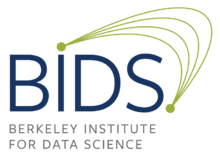Berkeley Institute for Data Science
The Berkeley Institute for Data Science (BIDS) is a central hub of research and education within UC Berkeley designed to facilitate data-intensive science and earn grants to be disseminated within the sciences.[1][2] BIDS was initially funded by grants from the Gordon and Betty Moore Foundation and the Sloan Foundation as part of a three-year grant with data science institutes at New York University and the University of Washington.[3][4][5] The objective of the three-university initiative is to bring together domain experts from the natural and social sciences, along with methodological experts from computer science, statistics, and applied mathematics.[6] The organization has an executive director and a faculty director, Saul Perlmutter, who won the 2011 Nobel Prize in Physics.[7] The initiative was announced at a White House Office of Science and Technology Policy event to highlight and promote advances in data-driven scientific discovery, and is a core component of the National Science Foundation's strategic plan for building national capacity in data science.[8][9][10]
 | |
| Established | November 2013 |
|---|---|
Faculty Director | Saul Perlmutter |
Executive Director | David Mongeau |
Parent organization | University of California, Berkeley |
| Website | bids |
Working groups
There are six working groups that are common across the three universities included in the original Moore/Sloan grant. The working groups are intended to "address the major challenges facing advances in data-intensive research" and include Career Paths and Alternative Metrics, Reproducibility and Open Science, Education and Training, Ethnography and Evaluation, Software Tools and Environments, and Working Spaces and Culture. and while all three are separate aspects of one division, they were awarded different grant money.
Notable fellows
A primary objective of BIDS is to build a community of data science fellows and senior fellows across academic disciplines. The 23 current fellows constitute the majority of the onsite liveware at the Institute, which supports a number of notable initiatives (via Fellow support). The following list is a subset of notable fellows to date:
- Nick Adams, fellow, principal investigator of the Deciding Force project[11][12]
- Fernando Pérez, senior fellow, creator of Jupyter and IPython[13][14]
- Dan Hammer, fellow, Presidential Innovation Fellow and former Chief Data Scientist at the World Resources Institute[15][16]
- Kathryn Huff, fellow, author of Effective Computation in Physics[17][18]
- Daniela Ushizima, fellow, DOE Early Career Research Award,[19] staff scientist at Lawrence Berkeley National Laboratory[20]
- Stéfan Van Der Walt, computational fellow, author of scikit-image[21][22]
- Laura Waller[23]
References
- Ungerleider, Neal (13 November 2013). "White House to Universities: We Need More Data Scientists". Fast Company. Retrieved 25 October 2015.
- Suthaharan, Shan (2015). Machine Learning Models and Algorithms for Big Data Classification: Thinking with Examples for Effective Learning. Springer. p. 10. ISBN 9781489976413.
- "NYU Part of Initiative to Harness Potential of Data Scientists, Big Data with Support from Moore, Sloan Foundations". New York University. 12 November 2013. Retrieved 26 October 2015.
- "UW, Berkeley, NYU collaborate in $37.8M data science initiative". University of Washington eScience Institute. 7 November 2013. Retrieved 26 October 2015.
- Baker, Monya (8 April 2015). "Data science: Industry allure". Nature. 520 (7546): 253–255. doi:10.1038/nj7546-253a.
- "Examples of Big Data Initiatives and Funding Projects". Data Sharing for Demographic Research. Eunice Kennedy Shriver National Institute of Child Health and Human Development. 2015. Retrieved 26 October 2015.
- "Launch of the Berkeley Institute for Data Science" (YouTube). Berkeley, California: CITRIS. 12 December 2013. Retrieved 5 November 2011.
- Lohr, Steve (12 November 2013). "Program Seeks to Nurture 'Data Science Culture' at Universities". New York Times. Retrieved 25 October 2015.
- "Data to Knowledge to Action" (PDF). Fact Sheet. White House. 12 November 2013. Archived from the original (PDF) on 2015-10-21. Retrieved 25 October 2015.
- Johnstone, Iain; Roberts, Fred (18 July 2014). Final Report from StatSNSF subcommittee (PDF). National Science Foundation. Archived from the original (PDF) on 5 March 2016. Retrieved 5 November 2015.
- Allred, Cathy (17 September 2014). "Deciding Force: What we learned from Ferguson". Daily Herald. Retrieved 5 November 2015.
- McMillan, Cecily; Gould-Wartofsky, Michael (17 September 2015). "Decriminalize dissent". Al Jazeera America. Retrieved 6 November 2015.
- "$6M for UC Berkeley and Cal Poly to Expand and Enhance Open-Source Software for Scientific Computing and Data Science". Business Wire. 7 July 2015. Retrieved 5 November 2015.
- Krill, Paul (14 February 2014). "IPython founder details road map for interactive computing platform". InfoWorld. Retrieved 6 November 2015.
- Strickland, Eliza (16 April 2014). "Google Earth Engine Brings Big Data to Environmental Activism". IEEE Spectrum. Retrieved 5 November 2015.
- Benderly, Beryl (13 July 2015). "Putting women at the controls at NASA". Science. Retrieved 5 November 2015.
- Scopatz, Anthony; Kathryn, Huff (2015). Effective Computation in Physics. O'Reilly Media. ISBN 9781491901595.
- Lowery, Jack (14 September 2014). "Women in Data Science: Kathryn Huff". Center for Data Science. New York University. Retrieved 6 November 2015.
- "U.S. Department of Energy Early Career Research Program". Retrieved 28 July 2017.
- Vu, Linda (10 July 2017). "Testing Brain-Inspired Chips for Big Data Problems". insidehpc.com. Retrieved 28 July 2017.
- Bressert, Eli (2012). SciPy and NumPy: An Overview for Developers. O'Reilly Media. p. 43. ISBN 9781449361624.
- "scikit-image". Python Package Index. Retrieved 5 November 2015.
- "Laura Waller". Berkeley Institute for Data Science.